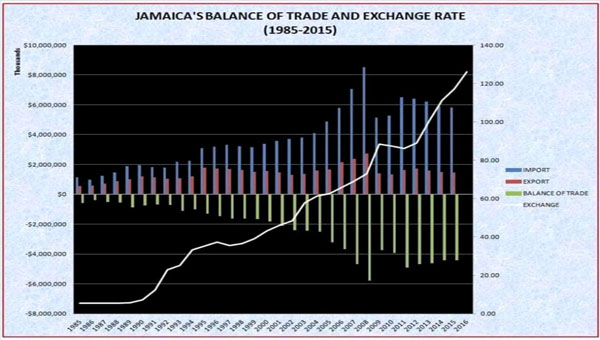Editor:
The financial balance of any economy is equal to its current account balance.
It implies, therefore, that you increase your productive capacity, not merely through currency swaps and cheap wages, but by ensuring that investments in the economy result in value-added outputs occupying the upper levels of the productivity spectrum for economic growth along the value chain, to offset the financial loss or write off from currency devaluation, which is added to the national debt, in the absence of increased productivity and growth.
US economists, Roy Bahl and Sally Wallace, both argued that “Jamaica’s paradox of high investment and low productivity might be attributed, at least in part, to having a macroeconomic program that channels investment to less-productive sectors” — hence its huge current account imbalance.
According to the Oxford Business Review: “Topping the list of economic challenges for these developing economies are chronic fiscal and trade deficits, which have birthed a myriad of debt traps, resulting in the need for constant currency devaluation, and a heavy reliance on remittances and foreign currency exchange.”
Trade is a well-established driver of growth and poverty reduction. But with devaluation as the only economic policy tool, this may result in distributional impacts that create winners and losers.
It is vital to understand, and communicate, how economic policy choice affects trade, the resulting economic well-being across all segments of the economy, and how policies can more effectively ensure that the gains from trade are distributed more widely.
In December 2015, the then-Governor of the Bank of Jamaica announced that “Jamaican Dollar No Longer Overvalued”
However, I found his remarks very sinister, as it would seem to suggest that the BOJ had concluded that constant devaluation was affecting its ability to maintain an acceptable debt to GDP ratio — perhaps the most structural impediment in our fiscal and monetary policies to growth and development.
But devaluation, in the absence of productivity gains, will impact our debt to GDP ratio negatively.
The BOJ Governor was saying at the time, at least in my opinion, that: we have optimized our comparative advantage, through the use of the exchange rate and, hence, our productive capacity to facilitate growth in the economy.
Therefore, in the current economic climate, with a devalued currency and low oil price, our export should be booming; but, quite the contrary, and therefore, it is no longer feasible for the government of Jamaica to leverage the competitive edge of the Jamaican economy on cheap wages and constant devaluation, the net impact of which is, according to the IMF (International Monetary Fund): “a negative net worth, which has the potential to hamper a central bank’s operational independence.
The IMF continued: “In addition, a central bank with a weak balance sheet, may be constrained in its ability to issue financial instruments as it tightens monetary conditions. Jamaica’s balance sheets are exposed to direct and indirect foreign currency risks, while its negative net International Investment Position (NIIP) reflects its sizable external public debt.”
Regards,
Silbert Barrett
 Pride News Canada's Leader In African Canadian & Caribbean News, Views & Lifestyle
Pride News Canada's Leader In African Canadian & Caribbean News, Views & Lifestyle


